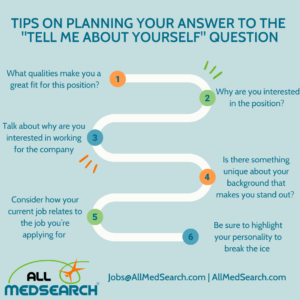
Your Guarantee for Making an Impressive First Impression
“Tell me about yourself,” or questions like it, are common at the beginning of interviews as they ease both you and the interviewer into the interview. It allows the interviewer to hear a short, summed up version of your background and skills, and it gives them insight into what experience and qualifications you think are most relevant to the position you’re interviewing for. By answering this question well, you are setting the tone for the interview as someone who is confident, good under pressure and attentive to the qualifications of the position.
What most candidates think about this interview question is “what do they want to know?” They want to know about you the candidate as a potential employee. They don’t want to know about your family, your last vacation, your hobbies, your religious beliefs, etc. The interviewers are not looking for your life story. They are trying to ascertain how you could fit on their team.
Be sure to keep it professional. Use examples, be specific with your answers, and stay focused on a few main points. When you get down to crafting your answer, think of it as where you’ve been and where you’re headed. Start off talking about what you’ve been doing before applying for this job and then wrap it up with a brief reason for why you’re interviewing.
Tips for planning your answer:
- What qualities make you a great fit for this position?
- Think of what makes you stand out as a job applicant for this role. Perhaps it’s your years of experience or some highly desired specialization, training or technical skills. Review the job description closely and note ways that you exceed the requirements.
- Why are you interested in the role?
- Think about why this position excites you, how it fits into your larger career goals and why you feel it’s the best next step.
- Why are you interested in working for the company?
- After you’ve spent time researching the company, you should have a better sense of their mission and goals. Do these align with the professional goals that you’ve set for yourself? What do you like and respect about the company as a whole? As you start building your story, tie together similarities among your professional goals, the future vision of the company that you feel are especially important.
- Is there something unique about your background that makes you stand out from other applicants?
- Try to think of something that will hook the interviewer. For example, if you have any awards you have won, interesting volunteer experience in the field, helped increase revenue for your department, etc.
How to answer the question:
- Mention past experiences and proven successes as they relate to the position
- Begin by rereading the job description. Take note of the required skills that you have, and identify recent stories that demonstrate them. Ideally, you should draw primarily from recent professional experience; however, volunteer work can also support your narrative while demonstrating a commitment to your community.
- Consider how your current job relates to the job you’re applying for
- Is it a more senior role? If so, explain how you are taking on more responsibilities in your current position. If you are making a lateral transition to a role with different skills, describe how your current skills translate into the new position.
Focus on strengths and abilities that you can support with examples:
-
- When you start building the script of each example, focus on details and outcomes that you can quantify if possible. For example, stating that you “improved customer service” is less impactful than “increased customer service response rates each quarter by 10–15%.” If you don’t have the exact information, estimate a realistic value.
- Highlight your personality to break the ice
- Since the “Tell me about yourself” interview question is about getting to know you, it’s a good idea to share your personality with your interviewer—but not personal details. You may want to briefly mention hobbies that demonstrate intellectual development and/or community engagement (e.g., reading, music, sports league, volunteering) or those that showcase personal discipline and achievement (e.g., learning a new skill, training for a half marathon). Discussing personal interests is a good way to wrap up your response while maintaining a professional tone.
